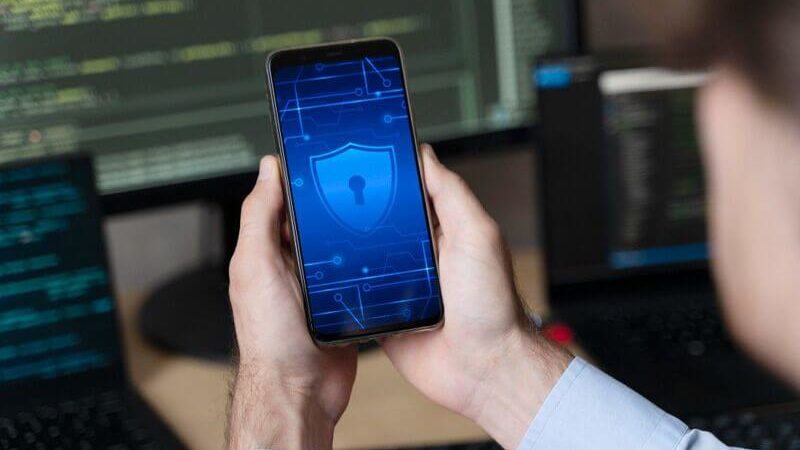How Do Hackers Hack Your Phone? How Can You Prevent It?

Image by Freepik
In May of last year, a woman suddenly found that her cell phone no longer worked. She contacted her provider, Spectrum, to have them check into it.
As it turned out, her phone had been hacked.
And, the damage was far-reaching. Soon, the criminals opened credit cards in her name and stole money from her personal and business accounts.
Although the victim was never 100 percent sure how the hackers accessed her phone, she’d been traveling recently. Authorities believe the incident may have happened while she was using public Wi-Fi.
How Does Someone Get Into Your Phone?
I remember the days before cell phones used biometrics. Every time we logged in, we had to input a six-digit passcode. The switch to thumbprint was such a relief.
Now, all I have to do is hold my phone in front of my face, and voilà! It unlocks.
My phone is tough, but not impossible to get into if it’s lost or stolen. However, there are many other ways a cell phone can be compromised. Here are a few of the most common:
1. You Click on a Phishing Link
I can’t tell you how many links I click each day.
Can you?
One thing I do know, though, is that none of those clicks come in email or text. Not unless I’m certain the link is coming from the original source.
How does clicking on a phishing link attack your phone? Easy – you click and malware downloads. You usually don’t even notice that you’ve installed something.
And yes, malware can infect your phone, too.
Once the malicious software is on your device, it can lurk in the background allowing hackers to gather the information they need. If it’s a keylogger virus, it captures every letter or number you input, including your usernames and passwords. If you bank online, you can imagine how dangerous it can be.
2. There’s a Vulnerability in Your Phone’s Operating System
Software manufacturers make every effort to create a secure environment for end users, but almost as soon as a new operating system is released, hackers find weaknesses or vulnerabilities to exploit. Those vulnerabilities are like unlocked doors, allowing scammers entry to your device.
And, that’s what those “updates” are for.
Almost every few weeks, it seems my phone is prompting me for another update. I always hesitate, afraid that upgrading will drain my already aging phone battery.
But the truth is, often those security updates can fix bugs that really drain the battery. Besides, do you know what can really drain a phone’s battery? Viruses. Viruses and bugs are exactly what those updates are designed to address.
So, the next time we’re asked to update, we should look at it differently. If there’s an open door on our phone, the manufacturer offers to close and lock it.
Failure to update your phone can leave it compromised. Hackers are well aware of which operating systems are vulnerable and design exploits or malware to create a backdoor into your system or download them onto affected devices.
3. You Use a Public Wi-Fi Network
We’ve all been guilty of hopping on a public Wi-Fi network while we’re out and about. Maybe we’re at the airport or a favorite restaurant. I don’t want to use my data plan to upload photos or share a video on TikTok.
As handy as it can be though, public Wi-Fi can be a problem for a couple of reasons:
- That open network leaves you vulnerable to hackers who might hop on the same network, looking for a device to infiltrate.
- Hackers set up fake Wi-Fi networks, which means you may be joining a scammer’s network.
Let’s talk about that last one for a second – fake Wi-Fi networks.
Here, scammers create a fake Wi-Fi network (a.k.a. an “Evil Twin”) and give it a broadcast channel name that’s similar to one you might expect to use.
For instance, if you’re at a coffee shop called “Joe’s Coffee” and their Wi-Fi broadcast channel name is “Joe’s Coffee Wi-Fi,” then hackers may set up a broadcast channel with a similar name to fool you, for example, “Joes Coffee” (without the apostrophe), or “Joe’s Cafe” (a slight variation of the business name).
The scammer may present you with a pop-up box asking for a credit card number to join, though not always. Sophisticated hackers could get that and other information stored in your device by nosing around.
Whether you’re on the scammer’s network or you simply share the same Wi-Fi, the goal is the same. The hacker wants to grab sensitive information from your phone. It could be banking usernames and passwords, credit card and debit card numbers, or information that can be used to steal your identity.
✎ Read: Risks of Using Public WiFi ➔
4. You Use Bluetooth
Wi-Fi isn’t the only way your phone is vulnerable to cybercrime when you’re in public.
With a Bluetooth hacking scam, cybercriminals exploit your phone’s Bluetooth connection. It would be best if you were nearby for this to work. The hacker uses a social engineering tactic to grab your information and download it. As long as your phone remains nearby, the data can be downloaded.
Since most of us leave our Bluetooth enabled while we’re out and about, it’s one way we’re all vulnerable to cybercrime.
5. You Lost Your Phone
None of us ever intends to lose our phone. In fact, I can think of a few things more disastrous.
Even if your phone is tough to unlock, a hacker can find a way. Once it’s in the wrong hands, your information is vulnerable.
The person who ends up with your phone won’t even have to be an expert hacker for your device to be at risk. If the phone continues to be used, even if someone erases it, data can still linger in it, and that data could be grabbed the next time that phone is on a public Wi-Fi network with a hacker.
6. Your SIM Card Is Swapped
Did you know your phone number can be stolen?
It’s something known as a SIM card swap scam, and it’s on the rise.
With this type of fraud, scammers contact your phone provider with a request to activate a SIM card they have. Your phone number is switched to the new SIM card, at which point the hackers have control of your phone number.
Using this phone number, scammers can then get around two-factor authentication to hack your bank accounts.
This is a more sophisticated scam – why? Because hackers also need to be able to access your bank account. This type of fraud is part of a more complex scheme that involves gathering personal data – the kind you may freely share on social media such as your full name, date and city of birth, etc.
How to Protect Your Phone from Hackers?
I don’t know about you, but I’m not ready to go back to flip phones. I like my smartphone. I also like being able to use it while I’m traveling.
The good news is, we don’t have to give up all that convenience.
Now that we know how our devices are vulnerable, we can lock them down so hackers can’t get to them or be sure to run those security updates.
Here are some things you can do to keep your phone, and your identity, safe.
1. Lock Your Phone with Encryption
It just takes a second for your phone to end up in the wrong hands.
Maybe you walk away from it at a coffee shop. Someone could pluck it directly from your handbag or back pocket. You might even leave it behind when you’re rushing to get from one place to another.
In the wrong hands, your phone becomes a tool for scammers to empty your financial accounts, as well as gather information that can be used for identity theft. It’s important to lock your phone down with encryption.
Here are some tips:
2. Never Skip an Update
When it comes to putting off software updates, I’m as guilty as the next person. In fact, I think my go-to line is, “I don’t have time for that right now.”
As I’m writing this, though, I’m updating my phone.
It will probably take ten minutes or so, but it’s so important.
Software updates help fix those weaknesses that let hackers in, as well as deliver updates that make your phone easier to use. If your phone’s manufacturer hears about a new vulnerability or bug, it will be addressed in one of those updates.
And, yes, that goes for all your devices–tablets, laptops, and desktops. If your Smart TV wants an update, say “yes” to that, too.
3. Stay Off Public Wi-Fi
Unlimited data is fairly standard on cell phones these days. Chances are, you won’t exceed it, especially if most of your phone’s life is spent on your home’s Internet Wi-Fi.
If possible, avoid hopping on public Wi-Fi while you’re out and about. This includes while you’re staying at hotels or working from your favorite coffee shop.
If you must use Wi-Fi, make sure you’re on a legitimate network. Ask an employee for the exact Wi-Fi name if you aren’t sure.
And, if you must use public Wi-Fi, consider a VPN, which leads me to the next point…
4. Use a VPN
Short for a virtual private network, a VPN protects your data when you’re on public Wi-Fi. Think of a VPN as a tunnel that allows your data to move back and forth without being intercepted.
When you use a VPN your data is encrypted, so if a hacker tries to intercept it all they will get is a bunch of garbled symbols.
VPNs have another benefit. They hide your real IP address, keeping you safe whether you’re in a hotel room or at a summer concert.
There are some affordable VPN options that can help keep you safe without breaking the bank. Proton, Surfshark, and ExpressVPN each have benefits, so compare their features and pricing to find the right service for your devices.
5. Turn Off Bluetooth
Turning off your Bluetooth between uses can seem like an extreme step. In fact, you may not even be aware of how often you use Bluetooth until you switch it off.
If you don’t want to turn off Bluetooth every time you’re away from home, just do it when you’re in a crowded area. If you start to feel uncomfortable, it’s one thing you can do to keep scammers at bay.
How to Tell If Your Phone Has Been Hacked?

Image by rawpixel.com
Like a thief breaking into a building, hackers creep into your phone undercover. The goal is to get in and out without you catching on.
But like thieves, hackers often can’t get by without leaving a few telltale signs. If you monitor things closely, it’s possible you’ll know when you’ve been hacked. Here are some things you might notice.
1. Massive Slowdowns
My phone is four years old, but it’s still chugging along. I know from experience that eventually, it will become unbearably sluggish, at which point I’ll replace it.
But old age isn’t the only reason a phone slows down. If your phone is running malware, it can cause things to lag. If you notice a sudden shift in the performance of your phone, it might be time to run an antivirus scan.
2. Rapid Battery Drain
Background activity doesn’t just drain your phone’s performance. You’ll also start to notice battery drain.
Certain malware has the ability to operate in the background, sending your data back and forth to the hacker. This will, of course, use up battery power.
A sudden drop in battery life should serve as a warning sign.
Look in your phone’s settings under Battery for a battery health indicator. This will let you know if your battery is, indeed, in need of replacement. If not, it could be a sign that you need a virus scan.
3. Strange Data
Whenever I visit relatives, it seems someone’s always showing me a phone screen.
“This icon suddenly appeared on my screen.”
“All my emails disappeared.”
Yes, some of that could be due to user error, but did you know that malware can cause strange things to appear on your screen?
Icons and missing messages aren’t the only things you might see. Hackers might send messages to your contacts or route pricey long-distance calls through your phone number. You might not know anything has happened until you get the phone bill.
4. Excessive Data Use
I have unlimited data, but a few years ago, I got a warning sign. My data was being throttled because I was using too much.
It was strange. I was rarely on my phone outside of the home. I researched it, and one of the top culprits of sudden data spikes was malware. I couldn’t find signs of malware, and the problem never happened again. I watched my data usage closely over the next few weeks.
Excessive data use could be a sign you’ve been hacked and/or you have a virus, but that isn’t the only reason you’d get that message.
You’ve Been Hacked, Now What?

Image by Freepik
Despite our best efforts, sometimes hackers find their way into our devices. If that happens to you, don’t panic. Here are some things you can do.
1. Remote Lock Your Phone
If your phone is no longer in your hands, you’ll want to take protective measures.
My phone is tracked on both my laptop and my husband’s phone. I can see its last known location at all times.
Ideally, you’ll be able to locate and recover your missing phone. But if you can’t, there’s a feature that lets you lock your phone remotely. The processes for Android and iPhone are similar. Do them as soon as possible to safeguard the data on your phone.
You can also use this feature to erase your phone remotely. This will wipe out any data that resides there and hopefully keep your identity from being compromised.
2. Invest in Identity Theft Protection
For hackers, hacking isn’t the goal. It’s merely a means to an end.
In some cases, hackers won’t do any damage. In others, you’ll notice some money missing or one of your accounts locked out.
But fraudsters can also be after something deeper. They can be after your identity.
Identity theft is on the rise, with cases having tripled over the past decade. With the right information, fraudsters can apply for credit, make purchases, set up utilities, and more.
And that information can be stolen from some phones.
Companies like Aura, LifeLock, and IdentityForce offer insurance policies to protect you against identity theft. They’ll not only help offset the cost of having your identity stolen, but they’ll also alert you of potential fraud.
3. Change Account Passwords
Once hackers can find their way into your phone, they can access everything inside it. That includes banking apps, email accounts, and social media accounts.
Go to each of those apps and reset your passwords. If two-factor authentication is enabled, keep in mind that it will likely go to your compromised phone number. If necessary, redirect that to your new number.
If your web browser auto-fills your credit card number, hackers may be able to use that, as well. Alert your card issuers of the potential compromise and have them advise you on the next steps.
Related: How To Protect Passwords From Hackers and Identity Theft ➔
4. Protect Your Phone Number
If you believe your phone number has been swiped, it might be time to change it. Get in touch with your wireless carrier and ask for a new number. You’ll also need to have your carrier block your SIM.
Yes, all of this is a pain, but otherwise, you could be on the hook for any charges a hacker racks up using your number.
5. Cancel Credit Cards
Our phones hold a lot of information on us, especially if we’ve set up a virtual wallet. While it’s possible the information is secure enough that hackers can’t grab it, there are no guarantees.
If you believe you’ve been hacked, get in touch with your bank. You’ll need to let them know what happened and let them take it from there. This probably means a switch in your payment cards, which can be a pain, but it’s worth it.
If someone runs up your credit cards, you’ll have zero liability protection. That protection is great, but it’s contingent on you reporting the theft as soon as you know about it.
6. File a Police Report
Hacking is a federal crime. That means law enforcement can prosecute it.
However, they can’t prosecute it if they don’t know about it. That’s where you come in. If you know for a fact your phone has been hacked, file a police report and let your local authorities take it from there.
Your isolated incident could very well be part of a larger pattern of activity that the police have been investigating. At the very least, you’ll have documentation to back up your incident if you later find your identity was compromised.
Conclusion
Although hackers can gain access to our devices, that doesn’t mean it’s guaranteed to happen.
Use the tech tools available to protect your phone and your identity, then avoid activities that can put you at risk.
Features like two-factor authentication can be exploited, but they also provide that invaluable layer of protection you’ll need if a scammer does find a way into one of your devices.
Related Articles About Securing Your Devices:



